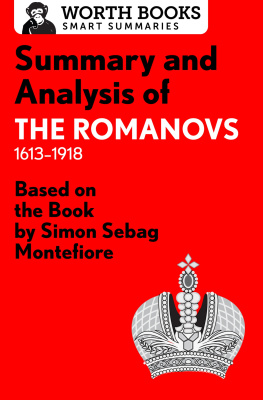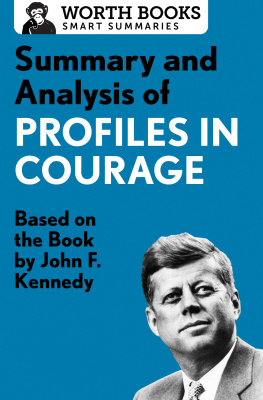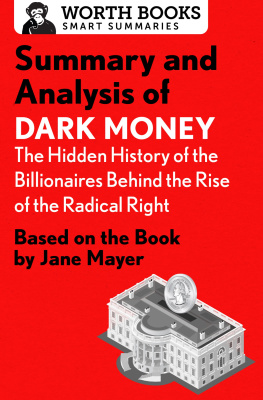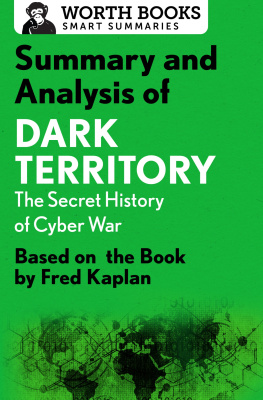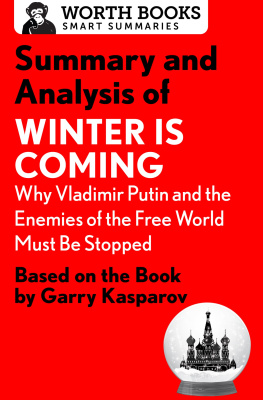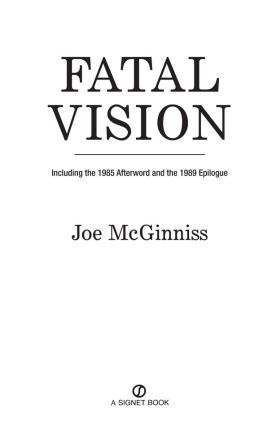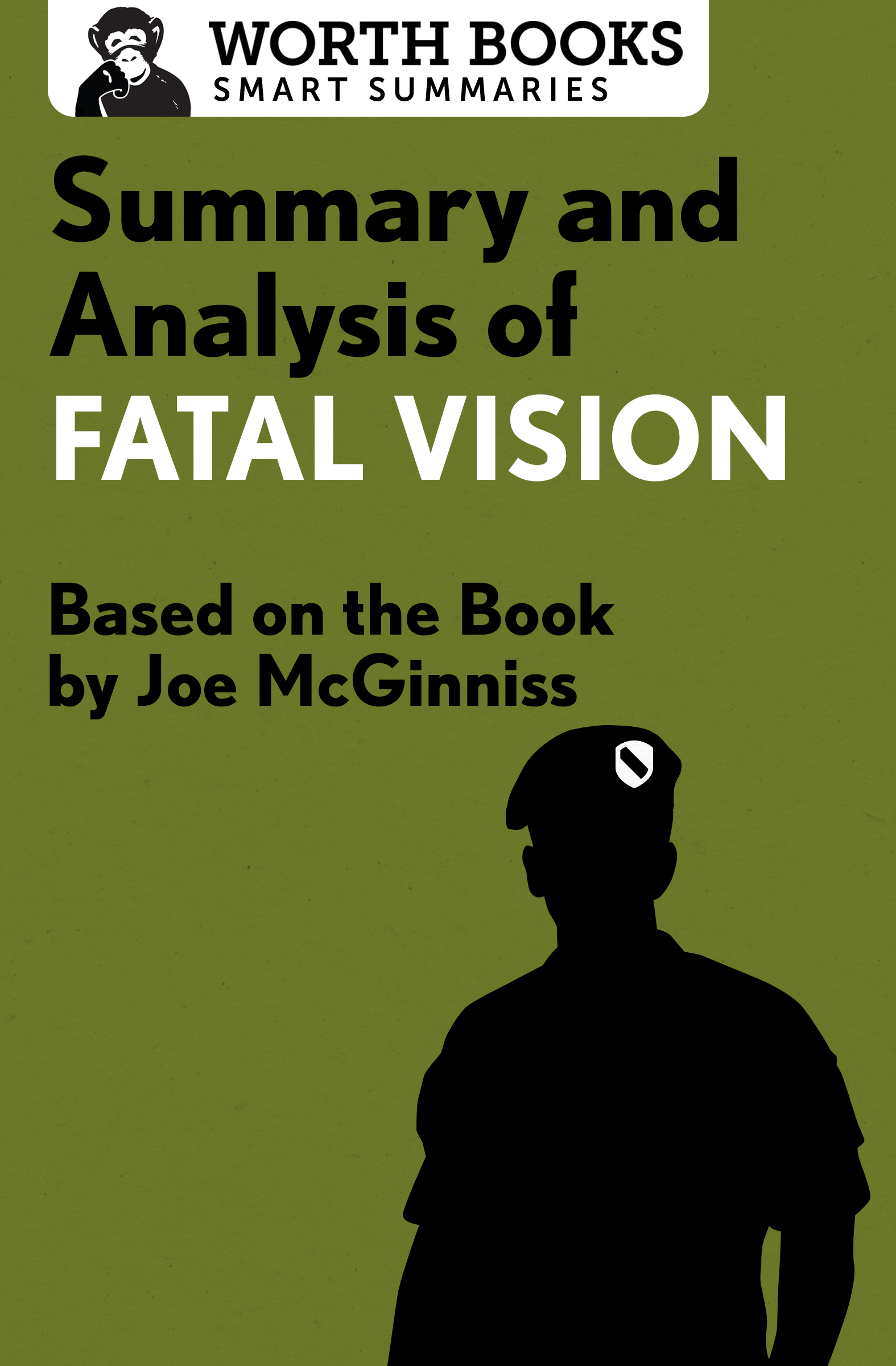Summary and Analysis of
Fatal Vision
Based on the Book by Joe McGinniss

Contents
Context
In 1970, the country was gripped by news of a brutal triple murder at Fort Bragg, North Carolina. Colette MacDonald, then pregnant, and her two young daughters, Kimberley and Kristen, were beaten and stabbed to death in their home. The prime suspect was Colettes husband, a charismatic military doctor named Jeffrey MacDonald.
During his trial, MacDonald invited journalist Joe McGinniss to have full access to him and his case in the hope that McGinniss would write a book about the ordeal, demonstrating MacDonalds innocence. In 1983, thirteen years after the murders, McGinniss published Fatal Vision . The final product revealed that, over the course of the trial, McGinniss had changed his mind about MacDonald, coming to believe that he had, in fact, committed the crime. MacDonald, by then incarcerated for the triple homicide, sued McGinniss for fraud and breach of contract in 1987, a case that was eventually settled out of court.
In addition to being a public sensation, the book raised important questions about the criminal justice system, the rights of the accused, and journalistic integrity. In 1990, New Yorker writer Janet Malcolm published a book about MacDonald and McGinnisss relationship called The Journalist and the Murderer , which explores these issues in depth. It was followed by other examinations of the case, including McGinnisss own 2012 ebook, Final Vision , a rebuttal to those who took issue with his conduct while writing the story of Jeffrey MacDonalds murder trial.
Overview
When Captain Jeffrey MacDonald, a surgeon and a Green Beret, was accused of brutally murdering his pregnant wife and their two young daughters, no one in the Fort Bragg community could believe he was guilty. Only those who worked the crime scene and knew the exact details of the case were certain he was their suspect. MacDonalds colleagues, and even his in-laws, were steadfast in their belief that he was innocent. So when MacDonald was exonerated by the military, most of those who knew him believed he deserved to be set free.
However, in his freedom, MacDonald went on a full press tour. He appeared on The Dick Cavett Show and began working as a doctor in New York City. During this time, his in-laws realized they had never heard the facts of what happened on the night of the murder. Colette MacDonalds stepfather, Freddy Kassab, spearheaded a campaign on behalf of the family to get the court records from MacDonalds case. When MacDonald stonewalled him, Kassab pursued the information through other routes. By the time he and his wife, Colettes mother, read the transcripts of the trial, the two had changed their mind about MacDonalds innocence.
Over the course of nearly five years, MacDonalds case stalled in the US Justice Department as Kassab worked to have the case brought to a civilian criminal court. Finally, in 1975, MacDonald was indicted for murder. The trial did not begin until 1979. By this time, MacDonald had hired writer Joe McGinniss to follow the story, assuming that he would write about his innocence. The resulting book, Fatal Vision , compellingly follows the events of the trial in real time. Interspersed with the story are sections told in MacDonalds own wordsincluding his recollections about his marriage to Colette and his insistence that he was innocent of the crime. (MacDonald always maintained that four hippie intruders babbling about acid had murdered his wife and children while he was knocked unconscious.) In August 1979, after a controversial and intense case, MacDonald was convicted of murder. Despite numerous requests for appeals, he remains in prison.
Fatal Vision is more than just an account of the murder trial, however; it is also the story of how Joe McGinniss came to change his mind about MacDonalds guilt, a process described in great detail.
Summary
Part One: The Shadow of Death
In the early morning of February 17, 1970, a 911 call is made from the MacDonald residence. Colette, 26; Kimberley, 5; and Kristen, 2, have all been brutally murderedbeaten and stabbed to death. Jeffrey MacDonald claims that four people whom he describes as hippies broke into the house, knocked him unconscious, and murdered his family. MacDonald says there were three men and a woman who wore a floppy hat. Doctors who treat the hysterical MacDonald at the hospital notice he is not injured aside from a few superficial stab wounds, and one particularly bad wound that punctured his lung. One of the potential murder weapons (a paring knife) is uncovered at the scene.
Colette and her two daughters are buried, and MacDonald is released from the hospital. Meanwhile, the military police are still working the scene at the MacDonald residence. MacDonald goes on vacation with his mother to get away from the tragedy.
Franz Joseph Grebner, the head Army investigator, is convinced that MacDonald perpetrated these murders. When the CID (Criminal Investigation Division of the military) questions MacDonald about the night of the murders, he waives his right to an attorney. This session of questioning is recorded and transcribed in full in the book. MacDonald is asked to take a polygraphhe refuses, and seeks out legal counsel.
Brutal but specific details are revealed about the murders and the crime scene. Though those who knew him didnt believe it was possible for him to have done such a thing, MacDonald is arrested for the murders of his wife and two daughters.
Need to Know: The unfolding narrative is interspersed with MacDonalds recollections of how he met Colette and the history of their early romantic involvement, including the story of Colettes pregnancies and the deliveries of both Kimberley and Kristen. These reoccurring sections, titled The Voice of Jeffrey MacDonald, add depth to the story through first-person perspective.
Part Two: The Hope of the Hypocrite
MacDonald hires Bernard (Bernie) Segal as his legal counsel. Segal hires a psychiatrist, Dr. Bob Sadoff, to do a full workup on MacDonald. Dr. Sadoff determines that MacDonald was not involved in the murders. Colette MacDonalds mother and stepfather, Mildred and Freddy Kassab, assert his innocence as well. During the entire time MacDonald is in custody, he exchanges letters with the Kassabs, some of which are included in the book.
During the military hearingreferred to as an Article 32 hearingSegal focuses on the CIDs poor handling of the crime scene, proving that it was disrupted many times over. He also finds a witness who claimed to have seen a woman matching MacDonalds description of one of his attackers standing near the MacDonald residence on the morning of the crime. (The woman in question would turn out to be someone named Helena Stoeckley, who did in fact live nearby and was a known drug user.)
Other colleagues and friends testify that MacDonald and Colette were happily married. MacDonald himself testifies for three days, answering questions about the state of his marriage, and whether or not Kristen had a bed-wetting problem. Colonel Warren Rock, one of the first members of the military to question MacDonald after the murders, testifies that he thought MacDonald was telling the truth. Charges are dropped due to insufficient evidence, and MacDonald applies for an honorable discharge.
Need to Know: While in police custody, MacDonald begins keeping a diary because he hopes to eventually sell the rights to his story. He pursues a tell-all interview with Newsday , and with other news organizations, even writing them letters stating his case. His story appears on the CBS Evening News with Walter Cronkite, and MacDonald himself appears on The Dick Cavett Show .


